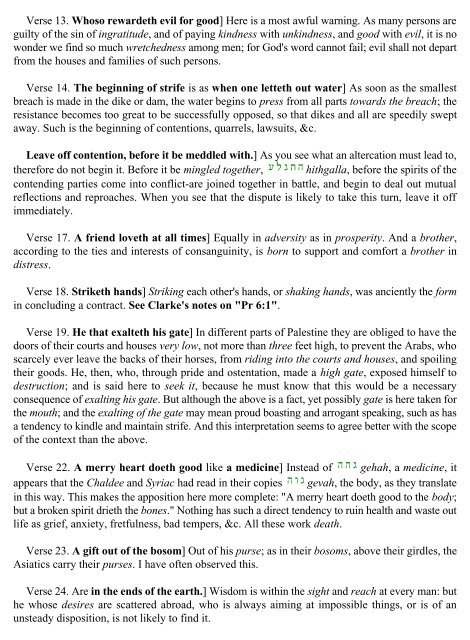Clarke's Commentary - Proverbs - Song Of ... - Media Sabda Org
Clarke's Commentary - Proverbs - Song Of ... - Media Sabda Org
Clarke's Commentary - Proverbs - Song Of ... - Media Sabda Org
Create successful ePaper yourself
Turn your PDF publications into a flip-book with our unique Google optimized e-Paper software.
Verse 13. Whoso rewardeth evil for good] Here is a most awful warning. As many persons are<br />
guilty of the sin of ingratitude, and of paying kindness with unkindness, and good with evil, it is no<br />
wonder we find so much wretchedness among men; for God's word cannot fail; evil shall not depart<br />
from the houses and families of such persons.<br />
Verse 14. The beginning of strife is as when one letteth out water] As soon as the smallest<br />
breach is made in the dike or dam, the water begins to press from all parts towards the breach; the<br />
resistance becomes too great to be successfully opposed, so that dikes and all are speedily swept<br />
away. Such is the beginning of contentions, quarrels, lawsuits, &c.<br />
Leave off contention, before it be meddled with.] As you see what an altercation must lead to,<br />
therefore do not begin it. Before it be mingled together, hithgalla, before the spirits of the<br />
contending parties come into conflict-are joined together in battle, and begin to deal out mutual<br />
reflections and reproaches. When you see that the dispute is likely to take this turn, leave it off<br />
immediately.<br />
Verse 17. A friend loveth at all times] Equally in adversity as in prosperity. And a brother,<br />
according to the ties and interests of consanguinity, is born to support and comfort a brother in<br />
distress.<br />
Verse 18. Striketh hands] Striking each other's hands, or shaking hands, was anciently the form<br />
in concluding a contract. See <strong>Clarke's</strong> notes on "Pr 6:1".<br />
Verse 19. He that exalteth his gate] In different parts of Palestine they are obliged to have the<br />
doors of their courts and houses very low, not more than three feet high, to prevent the Arabs, who<br />
scarcely ever leave the backs of their horses, from riding into the courts and houses, and spoiling<br />
their goods. He, then, who, through pride and ostentation, made a high gate, exposed himself to<br />
destruction; and is said here to seek it, because he must know that this would be a necessary<br />
consequence of exalting his gate. But although the above is a fact, yet possibly gate is here taken for<br />
the mouth; and the exalting of the gate may mean proud boasting and arrogant speaking, such as has<br />
a tendency to kindle and maintain strife. And this interpretation seems to agree better with the scope<br />
of the context than the above.<br />
Verse 22. A merry heart doeth good like a medicine] Instead of gehah, a medicine, it<br />
appears that the Chaldee and Syriac had read in their copies gevah, the body, as they translate<br />
in this way. This makes the apposition here more complete: "A merry heart doeth good to the body;<br />
but a broken spirit drieth the bones." Nothing has such a direct tendency to ruin health and waste out<br />
life as grief, anxiety, fretfulness, bad tempers, &c. All these work death.<br />
Verse 23. A gift out of the bosom] Out of his purse; as in their bosoms, above their girdles, the<br />
Asiatics carry their purses. I have often observed this.<br />
Verse 24. Are in the ends of the earth.] Wisdom is within the sight and reach at every man: but<br />
he whose desires are scattered abroad, who is always aiming at impossible things, or is of an<br />
unsteady disposition, is not likely to find it.
















